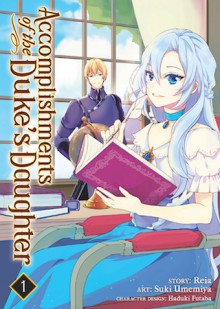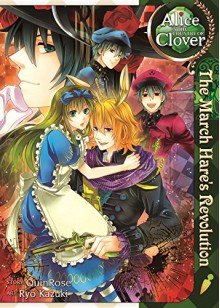
Although you could potentially start the series with this book and manage okay, I'd recommend that folks at least read A Princess in Theory, which introduces Nya Jerami, the main character of this book, and shows readers the events that resulted in Nya's father being put in prison. I skipped A Duke by Default, Book 2, which, from what I could tell, resulted in me missing out on the introduction of Johan von Braustein, the hero of this book, but didn't otherwise interfere with my ability to understand what was going on.
Okay, so this book stars Nya, a shy royal who's trying to break away from her father's lingering toxic influence. Living in New York City for a while hasn't really accomplished much - she dated a bit but still feels like her same awkward self. She's now heading back to Thesolo for Ledi and Prince Thabiso's wedding, only to find herself face-to-face with Johan von Braustein, the sexy, womanizing step-prince of Liechtienbourg, the same guy that the character in the royalty-themed otome game she's currently playing in based on. As she spends time with him, she gradually realizes that the person the media sees is very different from the person he actually is in private.
I'm trying to review this after having finished it a couple months ago, and it's dawning on me how much of the story was focused on Nya and Johan just getting to know each other and become comfortable with each other, because I'm looking over my notes I can't figure out what else, if anything to add to my summary. I mean, Johan was also dealing with a Liechtienbourgian referendum to abolish the monarchy, and there was a fake engagement between him and Nya. And also some stuff related to Johan's suddenly strained relationship with his younger sibling, who was the reason why he constantly got himself into the tabloids - if they were speculating about him and who he was with, they weren't focused on Lukas.
I'm a big fan of "shy heroine" romances, as well as flirty heroes who are secretly vulnerable and insecure. This book definitely worked for me on that level. It also helped that some of my own geekiness overlapped with Nya's. I loved the brief reference to a game that sounded very much like Hatoful Boyfriend, the best joke dating sim in existence. And the game Nya was currently playing, One True Prince, had gameplay that was very similar to one of my top favorite otome games, Mystic Messenger. Both games have real-time gameplay that requires players to answer phone calls, texts, and chats from the game characters at various times throughout the day and night - which resulted in some misunderstandings on Johan's part, as he mistook her frequent phone checking for signs that she had a secret lover (meanwhile, I cringed in anticipated embarrassment at the thought of how Johan might react once he found out she was actually "dating" a fictional version of himself).
I preferred the romance aspects of this book more than in the first book in the series, although I wish there hadn't been quite as much sex (the sex at the opera just made me roll my eyes). Johan and Nya were usually a pretty sweet couple. The book's nonromantic stuff, like the referendum, was dealt with more happily and easily than I could quite bring myself to believe, however.
If there was anything that might have prompted me to quit reading, it was the linguistic aspects. Johan occasionally used Liechtienbourgian words and phrases. It was clear that Liechtienbourgian was at least somewhat related to French and German, and some words and phrases, when plugged into Google Translate, registered as Luxembourgish. However, it used French and German words in ways that didn't fit or make sense, seemed to be doing weird things with Luxembourgish (I don't know that particular language myself, so I'm basing this off of Google Translate), and wasn't even always internally consistent. Some examples:
On page 30, Johan sends this message to Lukas: "Ça va, petite bruder?"
So we have something that looks like a mishmash of French and German and treats what looks like the German word for brother as though it were a feminine word.
Also, there were a couple instances of a phrase that looked like it was supposed to mean "good day" and seemed to mean that in context as well. However, this phrase was inconsistently written:
"Gudde jour" (46)
"Gutten jour" (117)
Unless they looked similar but meant different things - but again, the context indicated that they both likely meant something like "good day." When I tried plugging them into Google Translate out of curiosity, I was amused to learn that, in Luxembourgish, the first phrase apparently meant something like "good news," while the second one meant something like "boys are on duty."
Thankfully, I eventually either adjusted to the linguistic stuff enough to ignore it, or Cole gradually cut back on it.
The book included some LGBTQIA+ rep I wasn't expecting but thought was nice to see in a mainstream romance: Johan was bisexual, something I caught hints of early on in the book and that was unambiguously confirmed later on, and another character was nonbinary. Johan's bisexuality was worked into the text so smoothly that I found myself wondering whether homophobia and biphobia just didn't exist in this world. The stuff with the nonbinary character was a lot more heavy-handed, like when books introduce asexual characters with a chunk of unnatural-sounding "Asexuality 101" dialogue.
All in all, this was a nice entry in the Reluctant Royals series. I liked Johan and Nya as a couple more than Thabiso and Ledi, although this book's story was a lot weaker than the overall story in A Princess in Theory. I'm looking forward to reading more of this series, but I still have zero desire to go back and read A Duke by Default. I'm guessing that Sanyu and Shanti will be getting a book soon. They seemed miserable in this book, so it'd be nice to see them either fix their marriage or end up happily married to other people, if that's what Cole has planned instead.
(Original review posted on A Library Girl's Familiar Diversions.)

 Log in with Facebook
Log in with Facebook 









